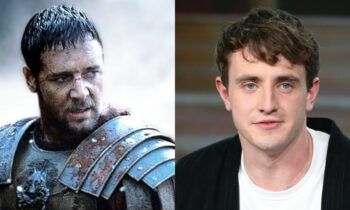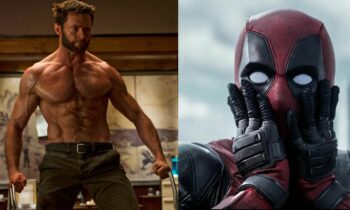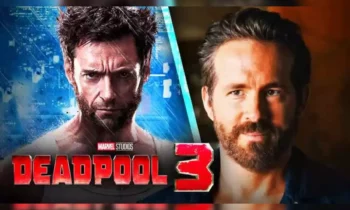Turning Red Spoiler Breakdown: Pandas, Periods, And Parents
When the trailer for Turning Red first came out, many of my friends texted me saying, “OH. MY. GOD. KEILIN THIS MOVIE HAS YOU WRITTEN ALL OVER IT.” I watched the trailer and wow. I have never felt so seen! The film takes place in 2002, the peak of my middle school days, and the trailer had it all. Backstreet Boys “Larger Than Life.” A Tamagachi wielding protagonist. Even the main character’s name is one letter off from my own name (Keilin versus Meilin). While my Comic Years college Shah already wrote a reaction post to the movie, I wanted to write a Turning Red spoiler review breakdown and delve into the film and representation, Domee Shi and the inspiration behind the film, and why it’s a movie for everyone, not just Asian-Canadian or Asian-American girls.
Turning Red Celebrates Middle School and Puberty In All Its Awkward Glory
 Image via Disney+
Image via Disney+
Turning Red is ultimately a metaphor for puberty and all the changes that happen during this tumultuous time. Meilin Lee (brilliantly voiced by Rosalie Chiang) is soaring through life. She’s got a great group of friends, she gets along with her mom, and one of her favorite bands of all time, 4*Town (very likely modeled after boy bands like O-Town, N*SYNC, and Backstreet Boys) is coming to town to perform! As Meilin says, “I wear what I want, say what I want, 24/7, 365!” Nothing can get her down until her mom embarrasses her in front of her crush. Needless to say, she does not sleep well that night and wakes up to discover she’s turned in an adorably giant red panda!
If I tried to preconceive a Turning Red spoiler breakdown, when I first saw the trailer, I’d have gotten it wrong. I admit that I thought it was going to be a movie about a family’s magical history with red pandas and that they were keepers of the furry creatures. Oh, I was so wrong. While there is magical realism in the movie, the idea that all the females in Meilin’s family turn into red pandas around their teenage years is definitely symbolic of hitting puberty. Domee Shi, the director of Turning Red (and Academy Award winner for her short, Bao) wanted to address this directly.
In the short documentary about the movie, titled Embrace the Panda: Making Turning Red, Domee Shi on Turning Red talks about how great it was to have an all-female team and says:
“I remember being (accepting of myself) at some point and then, you know, hitting that age and then suddenly turning very, very shy when I got acne. And then I was very aware of my body and all that stuff, and that’s what I wanted to explore with Mei turning into a red panda. She’s this girl that has her life together and then all of a sudden, magical puberty hits. There’s just so much comedy in female adolescence that I don’t see a lot of, and I just can’t wait to show people just how weird girls can be, because I was totally that as a teen and a young adult and now.”
On a similar note, Danielle Feinberg, the visual effects supervisor, said:
“We definitely have a lot of expertise on the movie about being 13-year-old girls, for sure. There is definitely a lived experience there that we get to bring to the movie-making, maybe in a different way than I would have been able to, say on a movie like WALL-E. You know, these things, these silly things you do. I definitely get what Mei is doing.”
Having an all-female team definitely shows too. The movie doesn’t shy away from getting your first period to awkward crushes to trying to be “cool” enough. It was really refreshing to see a teenager and her parents trying to navigate this awkward time, something that more television series and movies should do. As a female, I appreciated the period talk and loved that Pixar didn’t shy away from it. Being a teenager is already hard enough, so why should menstruation be something else to be embarrassed at?
Diversity Is Front And Center, Which Is Important Whether You’re BIPOC Or Not
 Image via Disney+
Image via Disney+
Yes, Turning Red is all about a Chinese-Canadian teenage girl, but that doesn’t mean it’s only for that demographic. Sure, maybe some things resonated more with me as a Chinese-American female, but again, Turning Red is a coming-of-age story. Who hasn’t wanted to crawl into a black hole after their parents did something cringeworthy? Who hasn’t been confused about their feelings for someone else? CinemaBlend Managing Director Sean O’Connell wrote a review saying “By rooting ‘Turning Red’ very specifically in the Asian community of Toronto, the film legitimately feels like it was made for (director) Domee Shi’s friends and immediate family members. Which is fine — but also, a tad limiting in its scope.” Because we definitely need more films about white men right?
On Turning Red and representation and movies and television series is that it acts as a window into another world or someone else’s life. Even though it’s not our life per se, seeing someone that looks like you onscreen matters. It says that someone from your background, culture, or experience shouldn’t be minimized and that it should be celebrated. And if a movie isn’t representative of you? Then it acts like a window into someone else’s experience, which is a wonderful way to learn about a community or individual who is different than you. Historically, movies have always been about white men and the “amazing” things they’re capable of, which continues to be a sensitive spot for those fighting for more diversity in Hollywood. It’s also problematic to give white men (and women, too) the power to tell a story from a culture that they’re not part of because it’s likely to be two-dimensional and full of assumptions. In Embrace the Panda: Making Turning Red, Rona Liu, the production designer, said this about Turning Red and representation:
“For Mei, it was important to design her the way that we saw ourselves. Her face is round, her ankles are thick. We definitely embraced her chunky cute. We were looking at each other’s face and were like, ‘We got moles. She should have moles.’ Then you’re like, ‘Rona, you have funny lips. You have that dip in your lip. Let’s put that in.’ When that part of myself gets celebrated and the director’s like, ‘Hey I like that, let’s put it in our main character’ you’re like, ‘Hey, why did I hate that for so long?’”
I know if I had seen a character like Meilin back in 2002, I would have been thrilled. The supporting cast of characters was also very diverse and for those haters that say, “Well, it was Toronto,” I’d argue that any form of media, whether it’s a movie or a television series, can be as diverse as it wants to be. Turning Red is a fun, fictional film, and isn’t the whole point of going to the movies to be transported to a new place? Hopefully, Turning Red spoiler breakdown highlights how movies for all people aren’t always going to be white and male-led.
I Have A Whole New Appreciation For My Parents

As Shah mentioned in his review, Turning Red is also about a parent’s relationship to their child and realizing how to let go. While Meilin’s mother was overbearing and often took things too far, she really does want what’s best for her daughter. While my own mother was nowhere near as over-the-top, I also understood better why she sometimes seemed to want to be a bigger part of my life. The scene with Meilin’s grandma and her mom was especially moving, mainly because it humanized mom as a person and not just an obstacle to Meilin having fun. She also had her own struggles and insecurities, and she wanted to make sure her own daughter didn’t have to go through the same things.
Overall, this movie was amazing! The little attention to Chinese cultural details throughout was really nice to see and I absolutely loved Meilin and her friends. In terms of Turning Red and representation, this was on-point. This was truly a movie after my own middle school heart and I’m so thankful that it exists!
Turning Red is currently streaming on Disney+.
Well that’s what this film meant to me, but what about you? Leave your own spoiler filled breakdown of Turning Red below. Was there anything that I missed talking about in regards to Turning Red and representation? How do you think Domee shi did with her biggest animated movie yet? How did the story gel with your experiences, no matter your background? Let us know in the comments!
Featured image via Disney+








Leave a comment